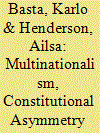|
|
|
Sort Order |
|
|
|
Items / Page
|
|
|
|
|
|
|
| Srl | Item |
| 1 |
ID:
145556


|
|
|
|
|
| Summary/Abstract |
In the 1975 referendum England provided the strongest support for European integration, with a much smaller margin for membership in Scotland and Northern Ireland. By 2015 the rank order of ‘national’ attitudes to European integration had reversed. Now, England is the UK's most eurosceptic nation and may vote ‘Leave’, while Scotland seems set to generate a clear margin for ‘Remain’. The UK as a whole is a Brexit marginal. To understand the campaign, we need to make sense of the dynamics of public attitudes in each nation. We take an ‘archaeological’ approach to a limited evidence-base, to trace the development of attitudes to Europe in England since 1975. We find evidence of a link between English nationalism and euroscepticism. Whatever the result in 2016, contrasting outcomes in England and Scotland will exacerbate tensions in the UK's territorial constitution and could lead to the break-up of Britain.
|
|
|
|
|
|
|
|
|
|
|
|
|
|
|
|
| 2 |
ID:
181265


|
|
|
|
|
| Summary/Abstract |
This article explores how the asymmetric institutionalization of the United Kingdom’s multinationality interacted with the COVID-19 pandemic. The UK’s political elite has traditionally accepted the country’s multinational character, but democratic institutionalization of it occurred relatively recently and in a remarkably asymmetric manner. Only the UK’s minority nations possess devolved governments, while the largest nation, England, is governed directly from the center. This framework has consequences for the pandemic response. It has clarified the relevance of devolved legislatures, but also highlights continued resistance of the UK’s governing elite to acknowledge the multi-level character of the state.
|
|
|
|
|
|
|
|
|
|
|
|
|
|
|
|
| 3 |
ID:
138884


|
|
|
|
|
| Summary/Abstract |
This article analyses political attitudes to the union in England, Scotland and Wales after the Scottish independence referendum. Using public opinion data, we explore constitutional preferences and perceptions of national grievance, before examining the role that national identity plays in structuring preferences. Our evidence shows that considerable demand exists for nationally demarcated forms of government within the UK, although these constitutional preferences do not translate in support for policy diversity across the UK. We also find evidence that these constitutional preferences relate closely to national identity, but relate also to appeals to national interest.
|
|
|
|
|
|
|
|
|
|
|
|
|
|
|
|
|
|
|
|
|